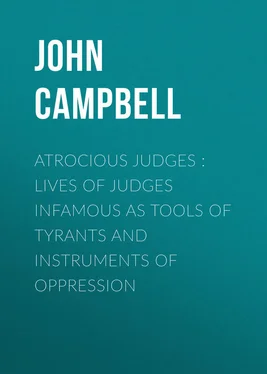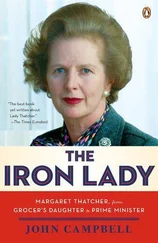John Campbell - Atrocious Judges - Lives of Judges Infamous as Tools of Tyrants and Instruments of Oppression
Здесь есть возможность читать онлайн «John Campbell - Atrocious Judges - Lives of Judges Infamous as Tools of Tyrants and Instruments of Oppression» — ознакомительный отрывок электронной книги совершенно бесплатно, а после прочтения отрывка купить полную версию. В некоторых случаях можно слушать аудио, скачать через торрент в формате fb2 и присутствует краткое содержание. Жанр: foreign_antique, foreign_prose, Биографии и Мемуары, на английском языке. Описание произведения, (предисловие) а так же отзывы посетителей доступны на портале библиотеки ЛибКат.
- Название:Atrocious Judges : Lives of Judges Infamous as Tools of Tyrants and Instruments of Oppression
- Автор:
- Жанр:
- Год:неизвестен
- ISBN:нет данных
- Рейтинг книги:5 / 5. Голосов: 1
-
Избранное:Добавить в избранное
- Отзывы:
-
Ваша оценка:
- 100
- 1
- 2
- 3
- 4
- 5
Atrocious Judges : Lives of Judges Infamous as Tools of Tyrants and Instruments of Oppression: краткое содержание, описание и аннотация
Предлагаем к чтению аннотацию, описание, краткое содержание или предисловие (зависит от того, что написал сам автор книги «Atrocious Judges : Lives of Judges Infamous as Tools of Tyrants and Instruments of Oppression»). Если вы не нашли необходимую информацию о книге — напишите в комментариях, мы постараемся отыскать её.
Atrocious Judges : Lives of Judges Infamous as Tools of Tyrants and Instruments of Oppression — читать онлайн ознакомительный отрывок
Ниже представлен текст книги, разбитый по страницам. Система сохранения места последней прочитанной страницы, позволяет с удобством читать онлайн бесплатно книгу «Atrocious Judges : Lives of Judges Infamous as Tools of Tyrants and Instruments of Oppression», без необходимости каждый раз заново искать на чём Вы остановились. Поставьте закладку, и сможете в любой момент перейти на страницу, на которой закончили чтение.
Интервал:
Закладка:
The judges having thus pledged themselves to repeal the act for him by misconstruing it, 44 44 We have had recent striking instances in America of the same thing in some of the “misconstructions” placed by judges on the laws in restraint of drunkenness and liquor selling. — Ed.
he allowed it to be added to the statute book. No sooner was the Parliament that passed it abruptly dissolved than it was flagrantly violated, and Selden, Sir John Eliot, and other members of the House of Commons, were arrested for the speeches they had delivered, and for requiring the speaker to put from the chair a motion which had been made and seconded. This proceeding was more alarming to public liberty than any thing that had been before attempted by the crown; if it succeeded, there was no longer the hope of any redress in Parliament for the corrupt decisions of the common law courts.
To make all sure by an extrajudicial opinion, 45 45 Like those given by several federal judges in support of the fugitive slave act. — Ed.
Lord Chief Justice Hyde and the other judges were assembled at Serjeants’ Inn, and, by the king’s command, certain questions were put to them by the attorney general. The answers to these, given by the mouth of the chief justice, if acted upon, would forever have extinguished the privilege and the independence of the House of Commons: “That a Parliament man committing an offence against the king in Parliament, not in a parliamentary course, may be punished after the Parliament is ended; for, though regularly he cannot be compelled out of Parliament to answer things done in Parliament in a parliamentary course, it is otherwise where things are done exorbitantly;” and “that by false slanders to bring the lords of the council and the judges, not in a parliamentary way, into the hatred of the people, and the government into contempt, was punishable out of Parliament, in the Star Chamber, as an offence committed in Parliament beyond the office, and besides the duty, of a Parliament man.”
The parties committed were brought up by habeas corpus , and, the public being much scandalized, an offer was made that they might be bailed; but, they refusing to give bail, which they said would be compromising the privileges of the House of Commons, Lord Chief Justice Hyde remanded them to jail.
The attorney general having then filed an ex-officio information against them for their misconduct in Parliament, they pleaded to the jurisdiction of the court “because these offences, being supposed to be done in Parliament, ought not to be punished in this court, or elsewhere than in Parliament.”
Chief Justice Hyde tried at once to put an end to the case by saying that “all the judges had already resolved with one voice, that an offence committed in Parliament, criminally or contemptuously, the Parliament being ended, rests punishable in the Court of King’s Bench, in which the king by intendment sitteth.”
The counsel for the defendants, however, would be heard, and were heard in vain; for Chief Justice Hyde treated their arguments with scorn, and concluded by observing, “As to what was said, that an ‘inferior court cannot meddle with matters done in a superior,’ true it is that an inferior court cannot meddle with the judgments of a superior court; but if particular members of a superior court offend, they are ofttimes punishable in an inferior court – as if a judge shall commit a capital offence in this court, he may be arraigned thereof at Newgate. The behavior of Parliament men ought to be parliamentary. Parliament is a higher court than this, but every member of Parliament is not a court, and if he commit an offence we may punish him. The information charges that the defendants acted unlawfully , and they could have no privilege to violate the law. No outrageous speeches have been made against a great minister of state in Parliament that have not been punished.” The plea being overruled, the defendants were sentenced to be imprisoned during the king’s pleasure, and to be fined, Sir John Eliot in £2000, and the others in smaller sums.
This judgment was severely condemned by the House of Commons at the meeting of the Long Parliament, and was afterwards reversed, on a writ of error, by the House of Lords. But Lord Chief Justice Hyde escaped the fate of his predecessor, Chief Justice Tresilian, who was hanged for promulgating similar doctrines, for he was carried off by disease when he had disgraced his office four years and nine months. He died at his house in Hampshire, on the 25th of August, 1631.
In justice to the memory of Sir Nicholas Hyde, I ought to mention that he was much respected and lauded by true courtiers. Sir George Croke describes him as “a grave, religious, discreet man, and of great learning and piety.” Oldmixon pronounces him to have been “a very worthy magistrate,” and highly applauds his judgment in favor of the power of the crown to imprison and prosecute Parliament men for what they have done in the House of Commons.
CHAPTER VII.
JOHN BRAMPSTON
On the vacancy in the office of chief justice of the King’s Bench, created by the death of Sir Thomas Richardson, A. D. 1635, the king and his ministers were exceedingly anxious to select a lawyer fitted to be his successor. Resolved to raise taxes without the authority of Parliament, they had launched their grand scheme of ship money, and they knew that its validity would speedily be questioned. To lead the opinions of the judges, and to make a favorable impression on the public, they required a chief on whose servility they could rely, and who, at the same time, should have a great reputation as a lawyer, and should be possessed of a tolerable character for honesty. Such a man was Mr. Serjeant Brampston.
He was born at Maldon, in Essex, of a family founded there in the reign of Richard II. by a citizen of London, who had made a fortune in trade and had served the office of sheriff. When very young, he was sent to the university of Cambridge; and there he gained high renown by his skill in disputation, which induced his father to breed him to the bar. Accordingly, he was transferred to the Middle Temple, and studied law there for seven years with unwearied assiduity. At the end of this period, he was called to the bar, having then amassed a store of law sufficient to qualify him at once to step upon the bench. Different public bodies strove to have the benefit of his advice; and very soon he was standing counsel for his own university, and likewise for the city of London, with an annual fee pro concilio impenso et impendendo , (for counsel given and to be given.) Having been some years an “apprentice,” he took the degree of serjeant at law.
According to a practice very common in our profession, he had, in the language of Mr. Gurney, the famous stenographer, “started in the sedition line,” that is, defending persons prosecuted for political offences by the government. He was counsel for almost all the patriots who, in the end of the reign of James I. and the beginning of the reign of Charles I., were imprisoned for their refractory conduct in the House of Commons; and one of the finest arguments to be found in our books is one delivered by him in Sir Thomas Darnel’s case, to prove that a warrant of commitment by order of the king, without specifying the offence, is illegal.
He refused a seat in the House of Commons, as it suited him better to plead for those who were in the Tower than to be sent thither himself. By and by, the desire of obtaining the honors of the profession waxed strong within him, and he conveyed an intimation, by a friend, to the lord keeper that it would be much more agreeable to him to be retained for the government than to be always against it. The offer was accepted; he was taken into the counsels of Noy, the attorney general, and he gave his assistance in defending all stretches of prerogative. Promotions were now showered down upon him; he was made chief justice of Ely, attorney general to the queen, king’s serjeant, and a knight. Although very zealous for the crown, and really unscrupulous, he was anxious to observe decency of deportment, and to appear never to transgress the line of professional duty.
Читать дальшеИнтервал:
Закладка:
Похожие книги на «Atrocious Judges : Lives of Judges Infamous as Tools of Tyrants and Instruments of Oppression»
Представляем Вашему вниманию похожие книги на «Atrocious Judges : Lives of Judges Infamous as Tools of Tyrants and Instruments of Oppression» списком для выбора. Мы отобрали схожую по названию и смыслу литературу в надежде предоставить читателям больше вариантов отыскать новые, интересные, ещё непрочитанные произведения.
Обсуждение, отзывы о книге «Atrocious Judges : Lives of Judges Infamous as Tools of Tyrants and Instruments of Oppression» и просто собственные мнения читателей. Оставьте ваши комментарии, напишите, что Вы думаете о произведении, его смысле или главных героях. Укажите что конкретно понравилось, а что нет, и почему Вы так считаете.












